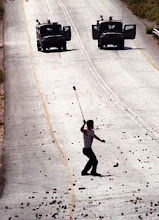hey everyone,
hanging out with some Kurdish fellows in the town of Nusaybin, and we were waiting for a protest to erupt against Turkish occupation. All the businesses were closed in solidarity, and I couldn't find any doner to eat, so they brought some cheese and olives for me from their houses.
As I crossed the border, I waved back to my new friends and said "Long Live Kurdistan", in Kurdish, to which the Turkish borders guards, already red from the near 45-degree temperatures (that's Celsius, guys), got even redder. Haha.
After about an hour of questions, all laughing though, I was allowed into Syria. In the town of Al-Qamishli, a mostly Kurdish town, I hung out with some more Kurds that go to Damascus University.
(Now the real depressing part, sorry that was just a prelude, a teaser.)
It was actually pretty depressing, because they were telling me how the Syrian government treats the Kurds (the same as the Turks). The only difference is that the Kurds can't really have a armed rebellion because in that area it is mostly desert (not much place to hide), and also Bashar's daddy, Hafez, taught everyone a lesson, when at the beginning of the 1980's, he squashed an Islamist uprising in the town of Hama by razing an entire section of the city with bombs. Result: a few thousand dead, and everyone knew who was the boss.
I saw how the police come by, and just to mess with people, take their bikes or whatever and say that they are in offense, and make them pay a fine. They came up to my Kurdish guests shoe stall and tried to say that suddenly they were in violation for something. Everything was settled with approximately 0.75 cents and a pat on the back. (That's a large sum considering a shoe salesman's worker makes about $3 a day). Corrupt as hell. They tried to come after me for something, but when I started speaking Arabic and said that I was Obama's long-haired brother, they gave sheepish grins and said "Welcome!"
Damascus is big. It's a tad cooler than Cairo, putting it around 110 degrees (that's Faranheit, guys). I'm trying to figure out how to find an apartment and get ready for school registration. I think that should be exciting.
So we'll see how this Syrian sojourn goes. If I end up pooping on a police car and going to jail, you guys will start a campaign to free me, right?
Oh, one thing, about militarism in the Arab world. It sucks and is really depressing. Check out this great article by one of those "backpackers" who was recently arrested in Iran after crossing from Iraq. http://www.thenation.com/doc/20090622/bauer. It's too bad that the empire and the rest of the world props up these guys to suit their own ends. Oh wait, that's the same story in Latin America, Africa, Asia and any non-Westernized country, right? I keep forgetting that and get all these romantic delusions. Damn.
And I promise that I won't try growing another Bashar-like moustache.


